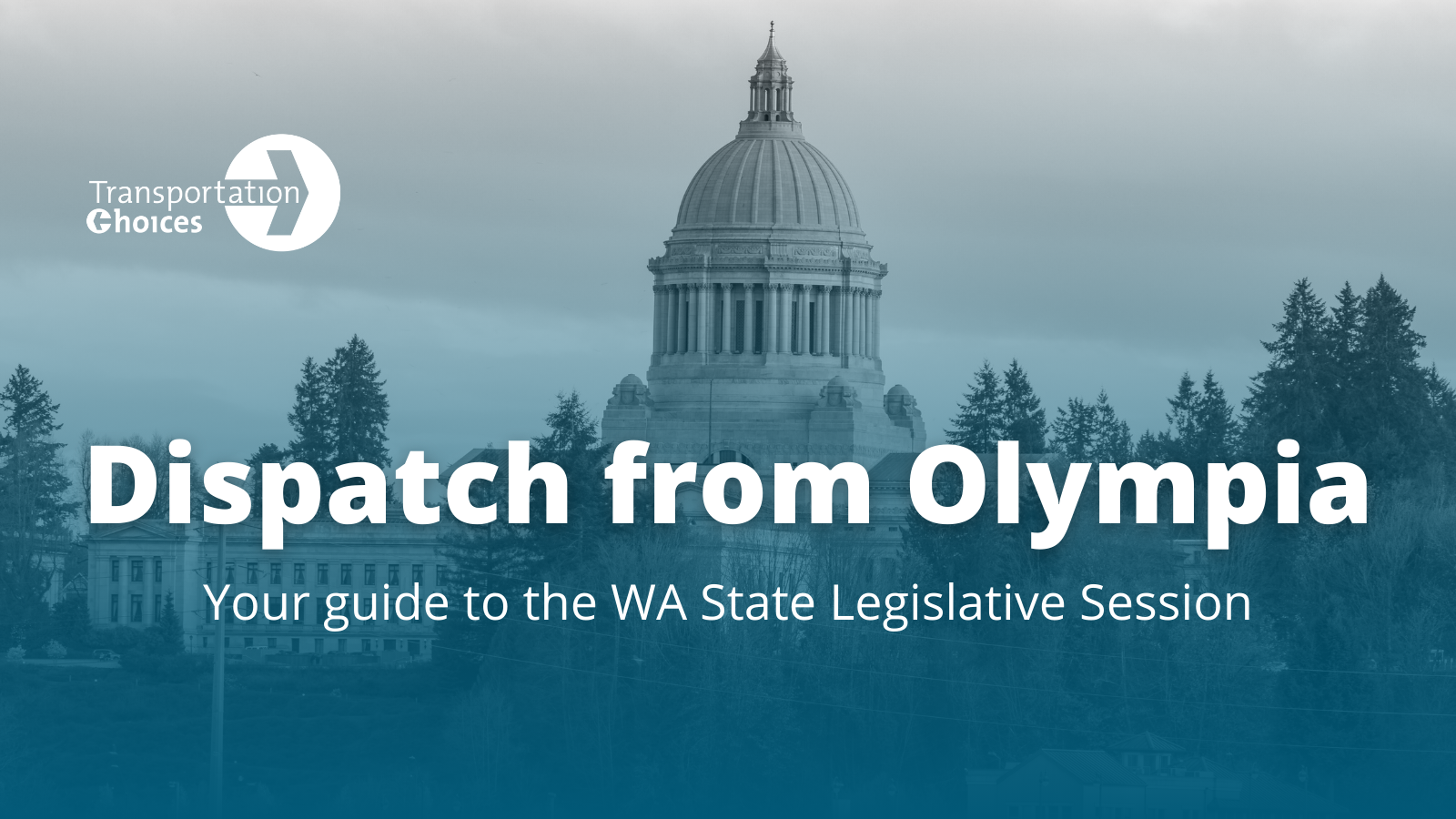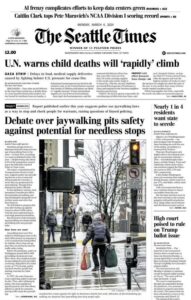
Dear friends,
The 2024 Legislative Session concluded last week, so this is your final Dispatch from Olympia this year. Below, you’ll find highlights from the Supplemental Transportation Budget, a recap of our efforts to reform Washington’s jaywalking laws, and a round-up of some of the transportation-related bills that passed and others that we hope to see again next year.
We’ve got our work cut out for us in the interim period before next year’s session. We’ll be campaigning against Initiative 2117, which would repeal the Climate Commitment Act, let polluters off the hook, and rip a giant hole in our state’s transportation budget. The Climate Commitment Act not only caps and reduces greenhouse gas emissions from Washington’s biggest polluters, it also funds investments in a more sustainable future, including billions of dollars for walking and biking infrastructure, transit, and fare-free rides for youth 18 and under. It’s absolutely critical that voters say NO to I-2117 in November.
One challenge we’ll continue to face next year is declining revenue from the gas tax and escalating costs for capital projects. In 2025, we’ll continue to advocate for new progressive funding sources such as a Road Usage Charge, in order to fulfill Washington’s transportation commitments and ensure we can fund the multimodal transportation that we need for a safe, sustainable, and equitable future.
Thank you for following along with us during the 2024 Session, for taking action, and for all the ways you help build a better transportation future.
Keep moving,
Transportation Choices
What’s in the Supplemental Transportation Budget?
Last week the legislature voted on a final conference committee proposal that updated the 2023-25 biennial supplemental transportation budget, approving an additional $30 million for public transit and $22 million for active transportation projects!
There are also some great investments in things we’ve been advocating for, such as $250K to help further study a Road Usage Charge, which could be a transformative progressive funding source for multimodal transportation, and $275K to support free youth fares in county ferry systems, which would expand the benefits of Youth Ride Free. We’ve compiled a summary of things we find exciting and interesting.
The Fight for Jaywalking Reform Continues
 Introduced for the first time in 2023, Senator Rebecca Saldaña brought back our Free to Walk bill to reform Washington’s jaywalking laws this Session. The bill made it further than last year, getting out of the Senate Rules Committee and onto the floor calendar, but it ultimately failed to make it out of the Senate.
Introduced for the first time in 2023, Senator Rebecca Saldaña brought back our Free to Walk bill to reform Washington’s jaywalking laws this Session. The bill made it further than last year, getting out of the Senate Rules Committee and onto the floor calendar, but it ultimately failed to make it out of the Senate.
Nevertheless, we’re making progress. Our revised bill included feedback from key stakeholders to improve its chances of being passed, and we’ve continued to educate legislators about this issue – both how jaywalking enforcement disproportionately impacts Black and unhoused people, and how it fails as a pedestrian safety measure.
In January, we released Ethan C. Campbell’s research report, “Ticket to Walk: How Jaywalking Enforcement Impacts Washingtonians,” and just last week, it was covered on the front page of The Seattle Times. Ethan was also interviewed live on KOMO 4 News! We know this research will continue to make a difference as we work to sway more legislators and get the bill passed next year.
Transportation Bills That Passed
In addition to the supplemental transportation budget, a couple of other transportation-related bills have been delivered to Governor Inslee:
SB 6283 to Extend the Sandy Williams Connecting Communities Program
The Sandy Williams Connecting Communities Program funds critical investments in active transportation in communities that are most impacted by environmental health disparities and barriers to opportunities. The program name honors Sandy Williams, a Black community activist who worked tirelessly to reconnect her Spokane neighborhood after the construction of Interstate 90 split it in half.
We’re excited to see this bill still moving ahead!
HB 2384 concerning automated traffic safety cameras
This bill would allow cities and counties to authorize traffic safety cameras under certain circumstances, and would allow non-commissioned officers or public employees to review infractions. It also outlines which kinds of violations can be enforced with traffic safety cameras, including driving in bus-only lanes, rail crossing, blocking intersections, ignoring a red light, and speeding. Learn more about the bill.
From an equity perspective, automated enforcement is a mixed bag. As our partners Whose Streets? Our Streets! write: “Automated traffic enforcement is better than in-person ticketing in many ways, but it is not a perfect solution. For one, it too can create inequitable financial burdens. It also can’t solve the problem of poorly-designed streets that encourage speeding.” Automated enforcement may also be more likely to be concentrated in communities that have faced historical disinvestment and have poorer infrastructure. You can read more about this issue from Whose Streets? Our Streets!
Transportation Bills That Died
Many bills did not survive, including:
HB 2160 to support transit-oriented development
SB 6052 to provide more oversight and transparency on petroleum markets
SB 5383 to reform Washington’s jaywalking laws and end harmful enforcement
SB 6010 to streamline permitting for certain trails and paths
In this short Legislative Session, there was a general hesitancy to move legislation due to the threat of ballot initiatives like I-2117, as well as the coming election, which will see a lot of legislator turnover and a new Governor. But next year will be here before we know it, and some of the work legislators and advocates have done to refine important legislation will have another opportunity to make a difference.
Are there policy ideas you’re excited about bringing to the legislature next year? Let us know! Email Hester Serebrin at hester [at] transportationchoices.org





